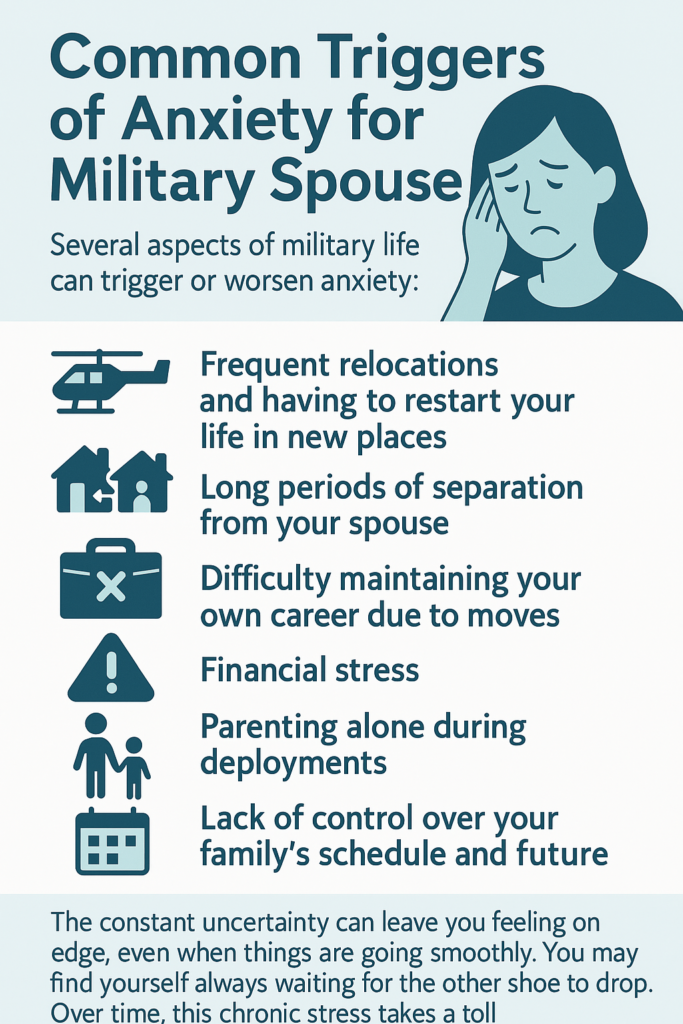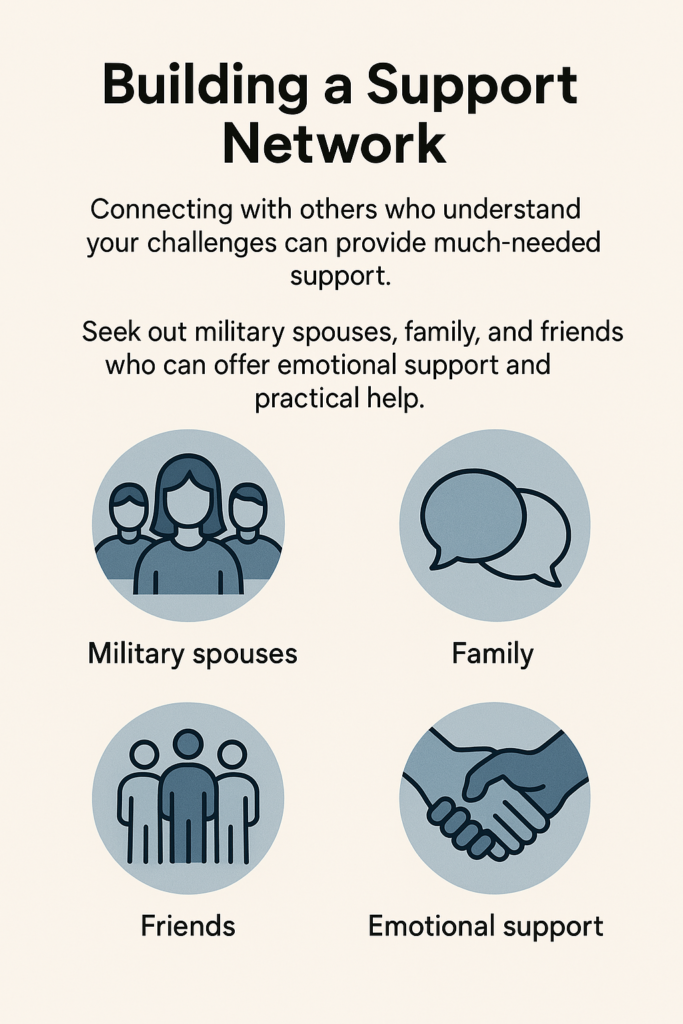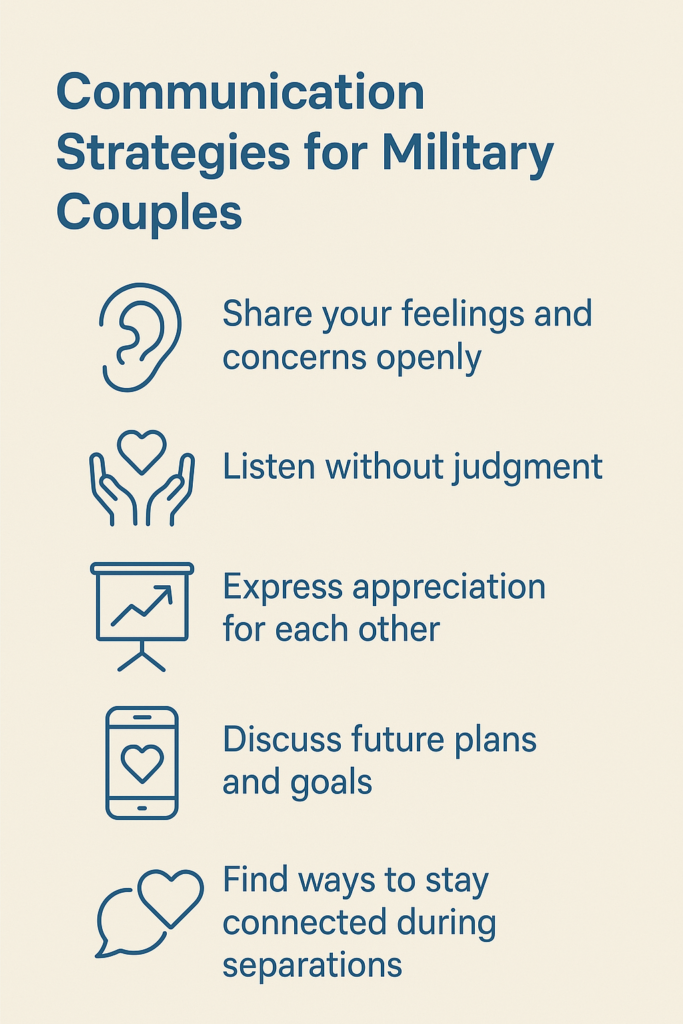Being married to someone in the military comes with a unique set of challenges. The constant worry about your partner’s safety, frequent relocations, and long periods of separation can take a toll on your mental health. Many military spouses experience anxiety as a result of these stressors. But you’re not alone, and there are ways to cope.
Anxiety is a normal response to the uncertainties of military life. In fact, it’s estimated that up to 25% of military spouses deal with anxiety or depression. The frequent moves, deployments, and unpredictable schedules can leave you feeling overwhelmed and out of control—not to mention, worry for your loved one.
While some level of worry is natural, excessive anxiety can interfere with your daily life and relationships. Learning to recognize the signs of anxiety and developing healthy coping strategies is crucial for maintaining your wellbeing as a military spouse.
Common Triggers of Anxiety for Military Spouses

Several aspects of military life can trigger or worsen anxiety. It is important to recognize what triggers your anxiety so that you can better manage your symptoms. Here are some common aspects of military life that can set it off:
- Deployments and dangerous missions
- Frequent relocations and having to restart your life in new places
- Long periods of separation from your spouse
- Difficulty maintaining your own career due to moves
- Financial stress
- Parenting alone during deployments
- Lack of control over your family’s schedule and future
The constant uncertainty can leave you feeling on edge, even when things are going smoothly. You may find yourself always waiting for the other shoe to drop. Over time, this chronic stress takes a toll on your mental and physical health.
Recognizing the Signs of Anxiety
Anxiety manifests differently for everyone. Some common symptoms to watch for include:
- Excessive worry that’s hard to control
- Restlessness or feeling on edge
- Difficulty concentrating
- Irritability
- Sleep problems
- Muscle tension
- Fatigue
- Panic attacks
Physical symptoms like rapid heartbeat, sweating, and nausea can also occur. If you’re experiencing several of these symptoms regularly, it may be time to seek support for anxiety.
Building a Support Network

One of the most important ways to cope with anxiety as a military spouse is to build a strong support network. Connecting with others who understand your unique challenges can make a world of difference.
Seek out other military spouses through on-base events, social media groups, or organizations like the Military Spouse Network. Having friends who “get it” provides invaluable emotional support and practical help.
Don’t be afraid to lean on family and civilian friends as well. While they may not fully understand military life, they can still offer comfort and assistance. Let your loved ones know how they can best support you.
Developing Healthy Coping Strategies
Learning positive ways to manage stress and anxiety is crucial. Some effective coping strategies include:
- Practice mindfulness and meditation
- Exercise regularly
- Maintain a consistent sleep schedule
- Eat a balanced diet
- Limit alcohol and caffeine
- Try journaling to process your emotions
- Pursue hobbies and interests that bring you joy
- Set realistic goals and break big tasks into smaller steps
Find what works best for you through trial and error. Having a toolkit of coping skills allows you to manage anxiety symptoms as they arise.
Prioritizing Self-Care
As a military spouse, it’s easy to put everyone else’s needs before your own. But neglecting self-care only increases anxiety and burnout in the long run. Make time for activities that help you relax and recharge.
This might include:
- Taking a relaxing bath
- Reading a book
- Getting a massage
- Spending time in nature
- Practicing yoga
- Having coffee with a friend
- Taking a class or learning a new skill
Remember that self-care isn’t selfish – it’s necessary for your wellbeing and ability to support your family.
Maintaining Your Identity and Independence
It’s common for military spouses to feel like their identity becomes wrapped up in their partner’s career. But maintaining your own sense of self is crucial for managing anxiety.
Pursue your own goals and interests, whether that’s education, career advancement, or personal passions. Look for portable career options or remote work that can move with you. Volunteer work can also provide a sense of purpose and community connection.
Stay connected to your personal support system, even when relocating frequently. Technology makes it easier than ever to maintain long-distance friendships.
Communication Strategies for Military Couples

Open, honest communication with your spouse is vital for managing anxiety in your relationship. When you’re able to connect, make the most of your time together:
- Share your feelings and concerns openly
- Listen without judgment
- Express appreciation for each other
- Discuss future plans and goals
- Find ways to stay connected during separations
If communication is difficult, consider couples counseling. Many military installations offer free relationship workshops and counseling services.
Seeking Professional Help
Sometimes, self-help strategies aren’t enough to manage anxiety. There’s no shame in seeking professional support. Military families have access to free mental health services through TRICARE and Military OneSource.
A therapist can help you:
- Identify anxiety triggers
- Learn coping techniques
- Process difficult emotions
- Develop healthy thought patterns
- Address any underlying issues
Cognitive-behavioral therapy (CBT) is particularly effective for anxiety. Medication may also be helpful in some cases.
Resources for Military Spouses
Numerous organizations provide support and resources for military spouses dealing with anxiety. Here are some places you can look for help:
- Military OneSource offers free counseling and resources
- The National Military Family Association has programs for spouse education and career development
- Operation Homefront provides financial assistance and support programs
- Give an Hour connects military families with free mental health services
Don’t hesitate to reach out and take advantage of the support available to you.
Embracing the Positive Aspects of Military Life
While military life comes with unique challenges, it also offers opportunities for personal growth and resilience. Many military spouses develop incredible strength, adaptability, and independence.
Focus on the positive aspects when you can. Cultivating gratitude for the positive elements can help balance out the anxiety-inducing aspects of military life.
Moving Forward with Strength and Resilience
Dealing with anxiety as a military spouse is an ongoing process. There will be good days and challenging ones. Remember that seeking help and prioritizing your mental health makes you stronger, not weaker.
By building a support network, developing coping skills, and taking care of yourself, you can thrive despite the challenges of military life. Your resilience not only benefits you but also strengthens your family and the entire military community.
You’re not alone in this journey. Reach out for support when you need it, celebrate your strengths, and take pride in the vital role you play in supporting your country through your family’s service.
At Allveteran.com, we seek to help veterans connect with resources that may make all the difference. To find out your disability rating, take our free medical evidence screening today!
 AllVeteran.com Advisors
AllVeteran.com Advisors
With expertise spanning local, state, and federal benefit programs, our team is dedicated to guiding individuals towards the perfect program tailored to their unique circumstances.


















